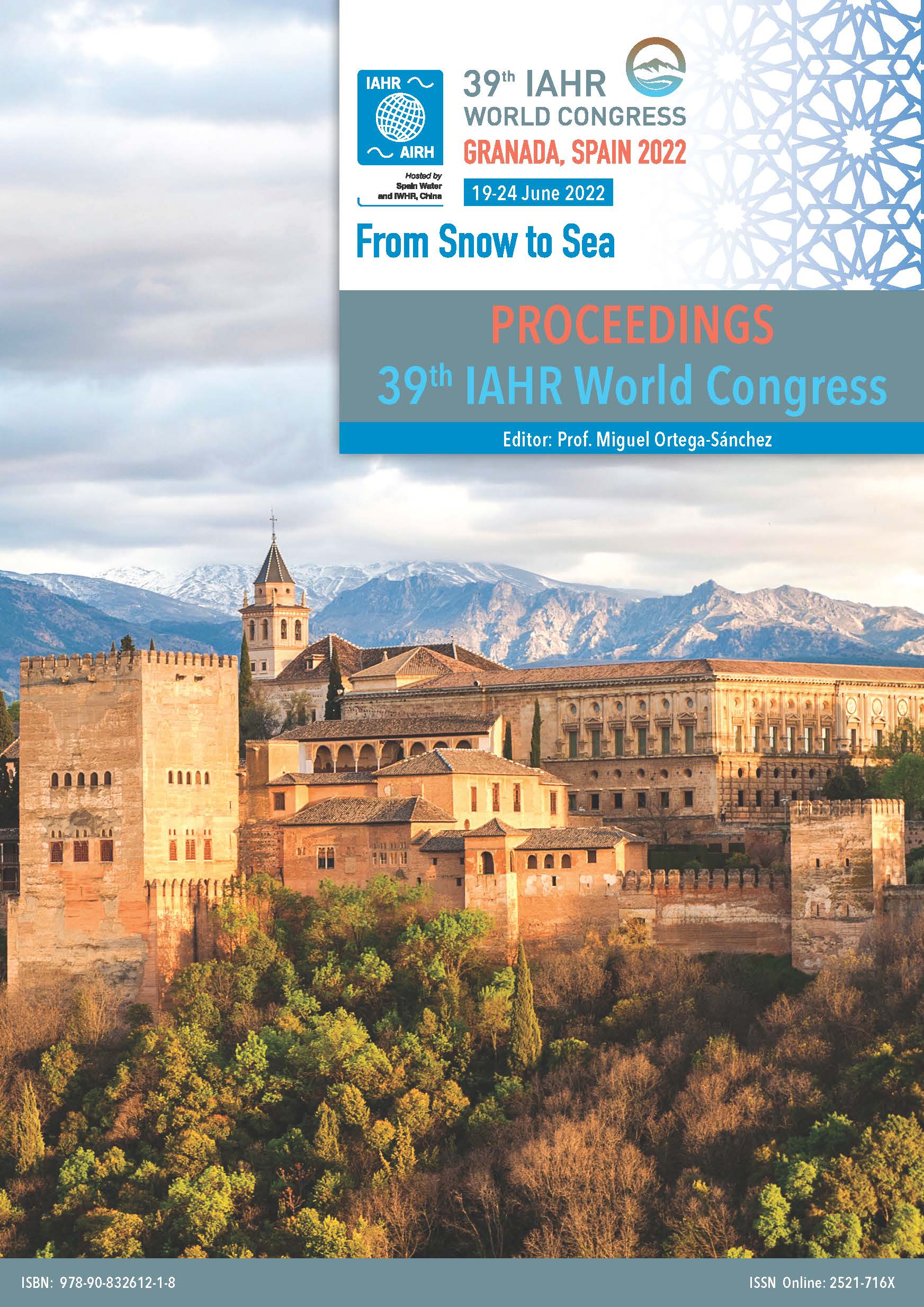IAHR Document Library

Proceedings of the 39th IAHR World Congress (Granada, 2022)
- ISSN Online: 2521-716X
- ISSN Print: 2521-7119
- ISBN: 978-90-832612-1-8
- Publisher: International Association for Hydro-Environment Engineering and Research (IAHR)
- Editor(s): Prof. Miguel Ortega-Sánchez, University of Granada, Spain
- Related: 39th IAHR World Congress
Innovative approaches to water management challenges are needed more than ever to ensure sustainable and resilient societies worldwide. Under the overall theme "From Snow to Sea", the 39th IAHR World Congress focused on the importance of an integrated and intelligent approach to managing the whole water cycle to address the global challenges people and the environment face. The Congress highlighted IAHR's commitment to the critical role that sound understanding of the water cycle plays in achieving the Sustainable Development Goals (SDGs) and Agenda 2030.
Revision process
The papers included in this volume were part of the 39th IAHR World Congress which took place in Granada, Spain, from 19 to 24 June 2022. Papers were selected and subjected to review by the Editor and the International Scientific Committee and followed a revision process with the following steps: (1) The committees involved in the organisation of the Congress established a set of technical criteria for the committee in charge of the revision. (2) Submitted papers were sent to one or two experts in the field. (3) Authors were asked to include the necessary amendments and follow the reviewers´ comments, and (4) Their work was reviewed until the final version was approved by the Editor.
Ethical guidelines and Code of Conduct
In addition to the technical criteria, IAHR publications follow the Ethical Guidelines and Code of Conduct provided by the Committee of Publication Ethics (COPE). A Publication Ethics and a Publication Malpractice statement are publicly available throughout the entire review process.
Besides the peer-reviewed papers, this volume contains the reports of the High-Level Panels.
The 39th IAHR World Congress proceedings are long-term preserved following the IAHR Policy of digital preservation archives.
Committees
The International Scientific Committee (ISC) and the Advisory Board provide counsel and support to the Congress Organising Group (COG) for the scientific and technical coordination of the congress.
Content
Theme 1: Human-water relationships (42)
Theme 2: Snow, river and sediment management (132)
Theme 3: Environmental hydraulics and urban water cycle (129)
Theme 4: Hydraulic structures (108)
Theme 5: Water resources management, valuing and resilience (109)
Theme 6: Computational and experimental methods (256)
Theme 7: Coasts, estuaries, shelves and seas (81)
Theme 8: Extreme events: from droughts to floods (177)
High-level panels reports
From Snow to Sea — Managing Enclosed Seas Under Climate Threat
Water Governance
Artificial Intelligence
Nature-based Solutions and Ecohydraulics
Keynotes
Coastal Resilience in a Changing Climate: the CoastPredict Solution
Water Challenges in Spain
Machine Learning for Scientific Discovery, with Examples in Fluid Mechanics
Special sessions
Reservoir sedimentation in semi-arid and arid environments. A comparative analysis from vulnerability of climate change in sensitive environments
Integrating ecohydraulics and ecohydrology in environmental flow assessments
Environmental hydraulics related to aquaculture
Ecohydraulics 2021: Novel methods to investigate flow-biota interactions numerically, in the lab and in the field
Green infrastructure and sustainable urban drainage systems
Implementing Nature Based Solutions – bringing science to practice
The shallow water model intercomparison session: Benchmarking overland flow simulations
Copyright: @2022 IAHR
| ID | Title | Authors | Year |
|---|---|---|---|
| 21591 | New Approach to Estimate Extreme Flooding Using Continuous Synthetic Simulation Supported by Regional Precipitation and Non-Systematic Flood Data |
Carles Beneyto; Jose Angel Aranda; Gerardo Benito; Felix Frances
|
2022 |
| 21592 | TESLA 2.0: A Climate-Based Emulator of Met-Ocean Parameters for the Analysis of Coastal Flooding Risk in Small Islands Affected by Extra-Tropical and Tropical Cyclones |
Fernando J. Mendez; Laura Cagigal; Alba Cid; Ana Rueda; Alberto Luceno; Sonia Castanedo; Beatriz Perez; Nicolas Ripoll; Sara O. Van Vloten; Manuel Zornoza; Alba Ricondo; Javier Tausia; Andrea Pozo; Israel Rubio
|
2022 |
| 21593 | Nature-Based Solutions to the Sustainable Management of Climate Change Impacts, Flooding, and Drought - Literature Review |
Tassew Mekuria; Peter Goodwin; Fredrika Moser; Cindy Palinkas; Ming Li
|
2022 |
| 21594 | Calculate of Design Floods in the Tonala River Basin Using a Regional Analysis of Rainfall and a Distributed Rainfall- Runoff Model |
Eduardo Juan Diego; Ramon Dominguez Mora; Eliseo Carrizosa Elizondo; Gabriela Esquivel Garduno; Andres Olaf Santana Soto; Maritza L. Arganis Juarez
|
2022 |
| 21595 | Influence of SUDS Allocated Area on Runoff Reduction in Developing Urban Catchments: A Case Study in San Sebastian (SPAIN) |
Eneko Madrazo-Uribeetxebarria; Maddi Garmendia Antin; Jabier Almandoz Berrondo; Ignacio Andres-Domenech
|
2022 |
| 21596 | Management of Urban Floods Based on Tolerable Consequences in an Uncertain Future |
Salar Haghighatafshar; Per Becker; Steve Moddemeyer; Andreas Persson; Johanna Sorensen; Henrik Aspegren; Karin Jonsson
|
2022 |
| 21597 | Runoff Coefficients Associated with Different Return Periods Calculated by Means of Statistical Analysis |
Mauricio Guillermo Ramirez Ambriz; Ramon Dominguez Mora; Maritza Liliana Arganis Juarez; Eliseo Carrizosa Elizondo
|
2022 |
| 21598 | Influence of Building Positioning on Flow Processes in Urban Flooding: Computational Modelling and Laboratory Experiments |
Xuefang Li; Sebastien Erpicum; Valentin Scheen; Emmanuel Mignot; Pierre Archambeau; Michel Pirotton; Benjamin Dewals
|
2022 |
| 21599 | Floods in Housing Estate: Some Experimental Data |
Frederique Larrarte; Nicole Goutal; Augustin Doumic
|
2022 |
| 21600 | New Dynamic Data-Driven Model for Predicting the Apparent Shear Force and Discharge of Compound Channels |
Xiaonan Tang; Prateek Singh; Yutong Guan
|
2022 |